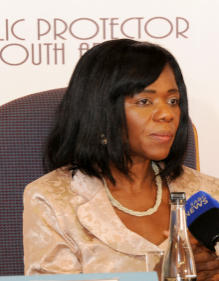|
Getting your Trinity Audio player ready...
|
 Dear Corruption Watch,
Dear Corruption Watch,
I am a great supporter of our current public protector, who seems to have done her best to investigate and report on corruption in the government. What happens when her term of office comes to an end? How can we ensure that an impartial person is appointed to this important position?
Non-biased
Dear Non-biased
The public protector is appointed for a non-renewable term of seven years. This means that Advocate Thuli Madonsela will not be eligible for reappointment after her term ends in 2016.
The public protector plays a vital role in exposing corruption and maladministration in the government. We should be vigilant to ensure that the next appointee is properly qualified, impartial and independent.
The appointment of a public protector is governed by the Constitution and the Public Protector Act. The public protector is appointed by the president on the recommendation of the National Assembly. The National Assembly will establish an ad hoc committee composed of representatives of all political parties to undertake a selection and interviewing process. The nomination of the committee must be approved by a supporting vote of more than 60% in the National Assembly – this procedural process ensures that all parties have a say in Parliament’s nomination to the president.
The constitution permits the involvement of civil society in the recommendation process. This provides an opportunity for the public to influence the choice of the new public protector, but it is not a requirement and depends on the National Assembly’s inclination to engage with the public.
Strict requirements for public protector
The Constitution requires that the public protector be a South African citizen who has shown themselves to be a fit and proper person. They must have exhibited a reputation for honesty and integrity. The appointee must be able to handle the politically sensitive nature of the public protector’s office, which will inevitably include investigations of political figures. This becomes difficult if they have been active in a political party or made public political pronouncements.
The previous public protector, Lawrence Mushwana, was appointed from his position as an ANC MP. This led to perceptions of favouritism and political influence, which troubled his time in office.
It appears that Parliament has realised this difficulty and Mandonsela, who was not an office bearer of any political party at the time, was nominated by Parliament following a 100% vote in her favour.
The act sets out the minimum qualifications and experience for appointment. The public protector must either have been appointed a judge, or obtained more than 10 years’ experience as a lawyer, advocate, law lecturer or MP, or held a position in the area of administration of justice, public administration or public finance.
The qualifications and experience of the public protector are important considerations because they provide the person with the knowledge, insight and ability to tackle serious investigations and be resilient under government pressure.
At the time of her appointment, the current public protector was a commissioner in the South African Law Reform Commission and had occupied positions in both the government and civil society.
The public protector is supported by the deputy public protector and a CEO, as well as a full office of almost 200 employees spread across the national office and nine provincial offices. These appointments must also be scrutinised so that the public protector has the proper support and assistance in fulfilling his or her constitutional mandate.
The new appointment process must be followed carefully to ensure that the constitutionally mandated process is followed and a person of integrity and experience is appointed as the new public protector.
• This article was first published in Sunday Times: Business Times



